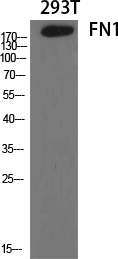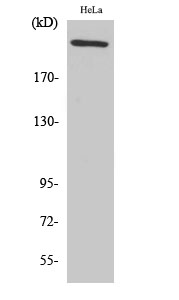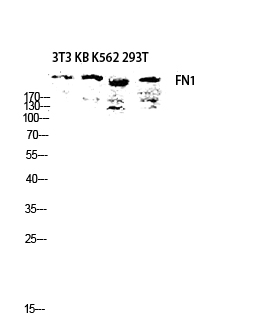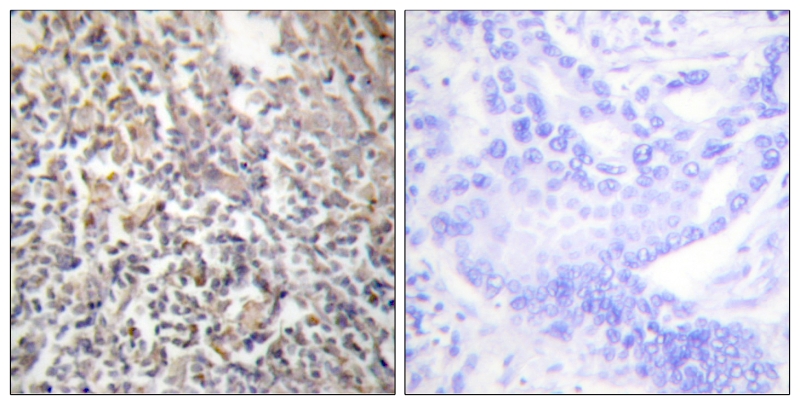



| WB | 1/500-1/1000 | Human,Mouse,Rat |
| IF | 咨询技术 | Human,Mouse,Rat |
| IHC | 1/50-1/100 | Human,Mouse,Rat |
| ICC | 技术咨询 | Human,Mouse,Rat |
| FCM | 咨询技术 | Human,Mouse,Rat |
| Elisa | 1/10000 | Human,Mouse,Rat |
| Aliases | FN1; FN; Fibronectin; FN; Cold-insoluble globulin; CIG |
| Entrez GeneID | 2335 |
| WB Predicted band size | Calculated MW: 272 kDa; Observed MW: 260 kDa |
| Host/Isotype | Rabbit IgG |
| Antibody Type | Primary antibody |
| Storage | Store at 4°C short term. Aliquot and store at -20°C long term. Avoid freeze/thaw cycles. |
| Species Reactivity | Human,Mouse,Rat |
| Immunogen | The antiserum was produced against synthesized peptide derived from human Fibronectin 1. AA range:2337-2386 |
| Formulation | Purified antibody in PBS with 0.05% sodium azide,0.5%BSA and 50% glycerol. |
+ +
以下是3-4条关于Fibronectin抗体的参考文献及其摘要概括:
---
1. **文献名称**: *"Monoclonal antibodies specific for human fibronectin: Application in Western blot and immunohistochemistry"*
**作者**: Akiyama SK et al.
**摘要**: 该研究开发了一种针对人Fibronectin的单克隆抗体,验证了其在Western Blot和免疫组化中的高特异性,适用于检测细胞外基质中Fibronectin的表达分布。
---
2. **文献名称**: *"Polyclonal antibody targeting fibronectin extra domain B modulates cell migration in vitro"*
**作者**: To WS et al.
**摘要**: 通过制备靶向Fibronectin额外结构域B(EDB)的多克隆抗体,研究发现该抗体可抑制肿瘤细胞迁移,提示其在调控细胞黏附和转移研究中的潜在应用。
---
3. **文献名称**: *"Functional blocking of fibronectin-integrin interaction inhibits cancer metastasis"*
**作者**: Guan X et al.
**摘要**: 利用功能阻断型Fibronectin抗体,研究证明抑制Fibronectin与整合素结合可减少肿瘤细胞侵袭和体内转移,为靶向治疗提供了实验依据。
---
4. **文献名称**: *"Comparative analysis of fibronectin antibodies in 3D cell culture models"*
**作者**: Corsi D et al.
**摘要**: 比较多种Fibronectin抗体在3D细胞培养中的检测效果,筛选出适用于活细胞成像和组织工程研究的优选抗体,并评估其交叉反应性。
---
这些文献覆盖了抗体的开发、功能验证及在疾病模型中的应用,可根据具体研究方向进一步筛选。
Fibronectin antibodies are essential tools in studying the extracellular matrix (ECM) and cellular processes. Fibronectin, a high-molecular-weight glycoprotein, plays critical roles in cell adhesion, migration, differentiation, and tissue repair. It exists as soluble dimers in bodily fluids or as insoluble fibrils in the ECM, interacting with integrins, collagen, and other ECM components. Its involvement in wound healing, embryogenesis, and disease pathways (e.g., fibrosis, cancer metastasis) makes it a key research target.
Fibronectin antibodies, both monoclonal and polyclonal, are designed to detect specific isoforms or domains of the protein. Monoclonal antibodies offer high specificity for defined epitopes, while polyclonal antibodies detect multiple epitopes, enhancing sensitivity for diverse applications. These antibodies are widely used in techniques like Western blotting, immunofluorescence, immunohistochemistry, and ELISA to visualize Fibronectin localization, quantify expression levels, or assess post-translational modifications.
In research, Fibronectin antibodies help investigate pathological mechanisms, such as tumor cell invasion driven by ECM remodeling or fibrosis characterized by excessive Fibronectin deposition. They also aid in evaluating therapeutic strategies targeting ECM dysregulation. Validation of antibody specificity (via knockout controls or blocking peptides) is crucial to avoid cross-reactivity with structurally similar proteins. Commercially available antibodies often undergo rigorous testing for reproducibility across models, including human, mouse, and rat tissues. Their utility spans basic biology, drug development, and diagnostic research, underscoring their importance in understanding ECM dynamics.
×